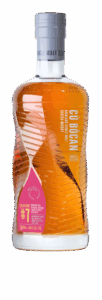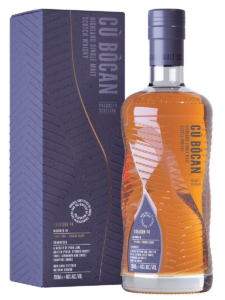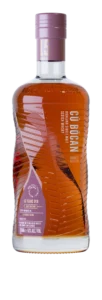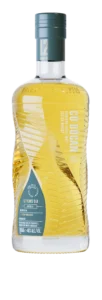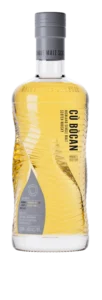- Cù Bòcan
Bacalhôa Moscatel de Setúbal
- on

Cù Bòcan Creation #1 is an unusually creative collaboration, this intriguing mix marries the best bits of its wine and beer counterparts; but what do you know about these counterparts? In this blog we’ll aim to unlock the answers to Moscatel wine. Perhaps you find yourself wondering, what is Moscatel? Or maybe you’re familiar with Moscatel, but want to know more about the flavours Moscatel casks can impart onto whisky.
Considered by many to be the original wine vine, the Muscat family of grapes is one of the oldest and most versatile grape families in the world. Thought to have originated in the Middle East, Muscat grapes have been cultivated in the Mediterranean for over 3,000 years. Today over 200 varieties are grown around the world producing wines that range in style from the sparkling, fruity Asti Spumante of Italy to the rich, sweet Rutherglen Muscats of Australia.
In Portugal two regions are famous for sweet, fortified Moscatel wines: the Douro and the Peninsula of Setúbal which is situated across the river Tagus from the city of Lisbon. Moscatel de Setúbal is produced with the Muscat of Alexandria grape which is believed to originate from ancient Egypt. The skins of Muscat grapes are rich in flavour, so they are left in during fermentation, and grape brandy is added when the wine has fermented down to the required degree of sweetness. The wine is then left on the skins for a further three months or more, to absorb as much flavour as possible before being aged for a minimum of 18 months in cask.
Moscatel de Setúbal was traditionally made with a minimum 67% of Muscat grapes, but now, under EU law, it must contain at least 85% of Muscat to name the grape on the label: as Moscatel de Setúbal, or Moscatel Roxo or simply Roxo.

Bacalhôa Vinhos de Portugal, one of the biggest and most innovative winemakers in Portugal, use 100% Muscat of Alexandria in their Moscatel de Setúbal production resulting in notes of marmalade, flowers and grapes in their younger wines. With longer maturation more complex notes of figs, nuts, earl grey tea and dried apricot develop with a gold, then mahogany colour.
Bacalhôa often age their Moscatels in used casks to encourage a gentle maturation with minimal oak influence, our relationship began when they approached us looking for used whisky casks. In return we were able to bring in a parcel of their casks in 2015, we filled these casks with Cù Bòcan spirit that had been distilled with malt peated to 15ppm in 2009 and originally matured in traditional oak hogsheads. Over two thirds of Creation #1’s recipe are from Bacalhôa Moscatel de Setúbal casks, and over the past four years these casks have imparted flavours of orange marmalade, dried apricots and melted butter.
Stay tuned for our next blog, we’ll delve further into the mastery of maturation with focus on Creation #1’s paired component, Black Isle Brewery Imperial Stout barrels.
